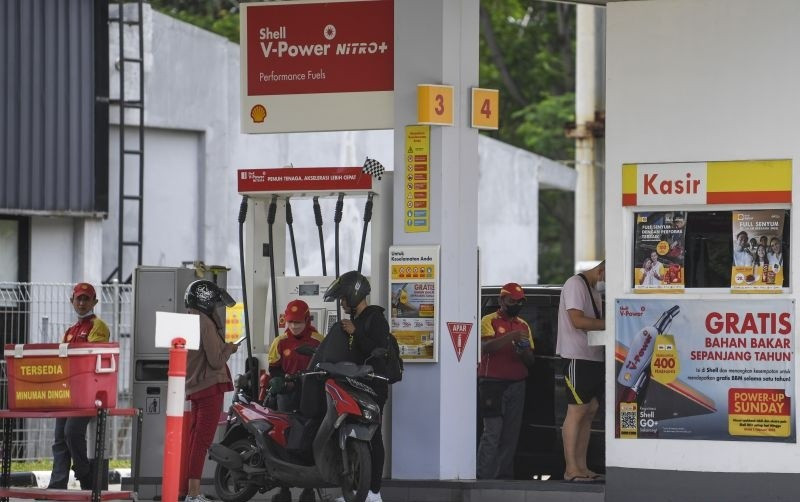News
Shell’s rocky exit paints cloudy future for private fuel retailers
Tenggara Strategics October 7, 2025 An employee fills a customer's vehicle on March 9, 2023, with fuel at a Shell gas station in Jakarta. (Antara/M Risyal Hidayat) (Antara/M Risyal Hidayat)
An employee fills a customer's vehicle on March 9, 2023, with fuel at a Shell gas station in Jakarta. (Antara/M Risyal Hidayat) (Antara/M Risyal Hidayat)
The planned exit of British energy company Shell exit from the gas station business in Indonesia, which is set to wrap up in 2026, has been marred by a troubled send-off. It comes at a time when private fuel retailers have struggled with national gasoline shortages throughout September, and Shell has been no exception to the supply crunch.
Despite Pertamina’s earlier promise to restock private stations, the procurement process has proven rocky. According to its downstream arm Pertamina Patra Niaga, 100,000 barrels of base fuel have been allocated for private operators since last week, but only Vivo has completed its purchase of around 40,000 barrels.
The shortage for Shell stations peaked on Sept. 30, when gasoline was unavailable at all of its stations in Jakarta, while Shell Super was only accessible at a handful of outlets in Banten, West Java, and East Java according to the company’s website. The base fuel Pertamina offered to private retailers comes from its own quota of imported gasoline. While the transaction price has not been disclosed, the limited uptake suggests it is relatively steep.
Another complication is the difference in product standards between what Pertamina is offering and what private retailers sell. Pertamina’s base fuel has a more generic specification, while companies like Shell, BP and Vivo typically sell gasoline with higher-grade formulations tailored for high performance. The issue is not a simple matter of supply and purchase, as each gas station operator ensures consistency in the products, they sell to retain customer trust.
Last month’s gas shortage stemmed from a convergence of factors, though the primary trigger was a surge in demand for nonsubsidized fuel following new government rules on Pertamina’s subsidized RON 90 gasoline product, Pertalite. Under the policy, consumers must now register and meet vehicle requirements to be eligible for purchasing Pertalite. The new system excluded many longtime users and as a result, demand shifted en masse to nonsubsidized RON 92 and above, fuel products that are supplied largely by private retailers such as Shell, BP and Vivo.
Compounding the issue is the corruption scandal involving Pertamina Patra Niaga. The company is accused of selling lower-grade fuel of RON 90 and below or a blend of RON 88 Premium with RON 92 at prices for RON 92 fuel, marketing it under the Pertamax brand. When the case surfaced earlier this year, public trust in Pertamax collapsed, prompting more consumers to switch to private gas stations and leading to a sudden demand spike, overwhelming their supply and leaving pumps dry.
At the same time, changes to Indonesia’s fuel import regulations added further strain. The government shortened the validity period of import permits for nonsubsidized fuel from one year to just six months, complicating planning for private operators. More disruptive still was a new mandate that private retailers import their fuel through Pertamina. This not only limited flexibility but also created bottlenecks: The state-owned company’s import channels and product specifications did not always match the requirements of private operators. What was once a relatively straightforward process has thus become prolonged, costly and technically difficult, leaving private gas stations caught in the middle of a shifting regulatory and market landscape.
Much of the government’s reasoning behind these regulatory changes derives from ongoing efforts to ease the fuel subsidy burden on the state budget. Yet the public reaction has been predictably negative, with many criticizing the Energy and Mineral Resources Ministry for its abrupt move. Critics contend that some measures, such as tightening import rules, could have been introduced more gradually, giving both the market and consumers time to adapt without jeopardizing the domestic fuel supply.
Adding to the frustration, the ministry’s public statements have done little to calm the situation. In a recent meeting with the House of Representatives, energy officials cited rising demand for nonsubsidized fuel as the main driver of the shortage, noting that Pertalite average daily sales fell 5.1 percent while nonsubsidized gasoline sales jumped 19.2 percent this year. By placing the blame on a shift in consumer behavior rather than changes in policy, the ministry was seen as sidestepping accountability, which only deepened public dissatisfaction.
What we've heard
An energy company executive said the fuel supply crisis at private gas stations was inseparable from the surge in consumers shifting away from Pertamina, after the fuel tampering scandal came to public light.

